Global Issues
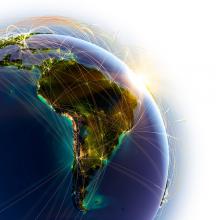
A global leader in ecumenical movement has alerted participants to the forthcoming World Council of Churches 10th Assembly in Busan, to be aware that they meet in rapidly changing times for world Christianity.
He says there are consequences for all church institutions, including the WCC itself.
Rev. Wesley Granberg-Michaelson, in a book timed to coincide with the gathering, says so fundamental are the changes now shaping the Christian world that the WCC will need to "commit to deep change."
It they don't, he says, they could remain largely isolated from the dynamic and growing parts of the church, especially from the global South.
His perceptions are likely to strike a chord at when the World Council of Churches meets in Busan from Oct.30 to Nov. 8 for its 10th Assembly, the highest decision making body of the grouping that represents some 560 million Christians.
Granberg-Michaelson, is a former member of the main governing body of the WCC, its central committee, and worked on the staff of the organization for six years, originally as director of the Church and Society programme.
He says the book, From Times Square to Timbuktu, is an attempt to describe the "growing gulf" occurring in world Christianity, primarily between the burgeoning Pentecostal and evangelical churches in the global South and the declining churches of the global North.
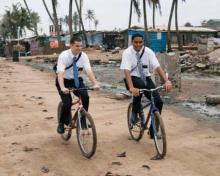
Four died in transit accidents. Four succumbed to health problems. One was electrocuted while doing a good deed and another fell to a stray bullet.
Ten Mormon missionaries have died so far in 2013, far above typical levels. And while church officials insist the spike doesn’t represent a trend, it has raised anew the question: Is missionary work safe?
The answer, according to the head of the faith’s Missionary Department, is an emphatic yes.
In a rare statement issued in September after the 10th missionary died, Elder David F. Evans said Mormon missions are inherently safe. At the same time, he offered words of solace to the affected families.
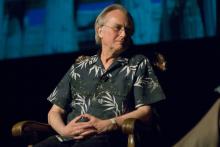
First things first: with all due respect to interim host John Oliver, I for one am thrilled to have Jon Stewart back on The Daily Show. I know it is sad to say, but I actually missed him while he was on summer hiatus. Welcome back, little buddy!
Last night, Stewart interviewed Richard Dawkins, author of The God Delusion, who was promoting his newest title, An Appetite for Wonder. The most interesting moments in the interview revolved around Stewart’s question to Dawkins about whether science or religion ultimately would be responsible for hastening our journey down this path of apparent self-annihilation. What followed was a fascinating, if not entirely satisfying, dialogue about the “downsides” of both disciplines.
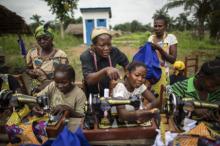
Angélique Namaika, a Roman Catholic nun, rides a bicycle on the rutted roads of the Democratic Republic of Congo’s northeastern province of Orientale, which is plagued by rebel violence.
On these same roads, the Lord’s Resistance Army, a Christian rebel group led by Joseph Kony, a self-proclaimed prophet of God, has been killing, abducting, and mutilating women and children.
But none of that has deterred Sister Namaika from helping displaced women learn trades, start small businesses, and go to school.
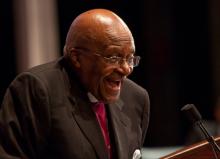
Retired Anglican Archbishop Desmond Tutu, who won the Nobel Peace Prize for his fight against apartheid in South Africa, continues to speak around the globe on justice and peace. Butler University and neighboring Christian Theological Seminary in Indianapolis announced Thursday that they would name a center for the 81-year-old icon.
Just before the announcement of the new center, Tutu spoke with Religion News Service about faith and justice, Israel and Palestine and Pope Francis’ recent selfie and lifestyle choices. Some answers have been edited for length and clarity.

The government of Malaysia expelled a group of Singaporean tourists for chanting Buddhist prayers inside an Islamic prayer room where they erected a large Buddhist painting on the wall facing Mecca.
The government also revoked the permanent resident visa of the businessman who allowed the Buddhists to pray at his beach resort in Johor state, about 185 miles south of Kuala Lumpur, the capital of Muslim-majority Malaysia.
The government’s response is the latest in a series of crackdowns on behavior deemed disrespectful of Islamic traditions and beliefs.
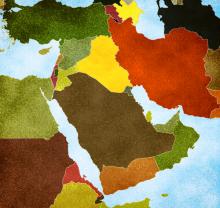
The backlash against Muslim Brotherhood rule in Egypt comes as secular forces across the Middle East are rising up in opposition to political Islam. Divisions reach from top leaders to the street.
Political leaders in Saudi Arabia, United Arab Emirates, Kuwait and Jordan have sided with the Egyptian military and secularists who backed the July 3 ouster of President Mohammed Morsi.
On the streets of Cairo over the weekend, mobs and snipers attacked Morsi supporters, forcing security forces accused of slaughtering the Islamists to stand between them and the mob. The violence in Egypt echoes similar, though less deadly, backlashes against Islamic ruling parties in Tunisia, and Turkey.
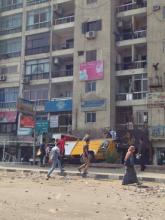
Egypt now teeters on the edge of an abyss. Sen. John McCain (R-Ariz.), who was in Cairo earlier this month at President Obama’s request to mediate between the military-backed interim government and supporters of ousted President Mohammed Morsi, told CBS News: “Oh my God, I didn’t know it was this bad. These folks are just days or weeks away from all-out bloodshed.”
The widely anticipated military crackdown against pro-Morsi demonstrators began last week, so we’d better brace for the blow-back.
The rising specter of repression in Egypt is difficult to watch for two reasons. First, it confirms that the counterrevolution is successfully restoring the deep state — the vast security apparatus upon which military autocracy in Egypt has been based since Gamal Abdel Nasser’s rule in the 1950s, effectively extinguishing any hope of transition to democracy. Second, the violent crackdown evokes bad memories of earlier efforts by Egypt’s military strongmen to crush their Islamist opposition.

Schismatic Roman Catholic priests, who left the church to claim their right to marry, are now asking for an “African pope” to lead them.
The priests say they regret their former church is “allergic” to change. They believe priestly celibacy is neither rooted in the teachings of Jesus nor in the work of his apostles, who were married. And they insist celibacy does not work in an African context.
Former Zambian Archbishop Emmanuel Milingo who married a Korean acupuncturist in a 2001 celebration sponsored by the Unification Church and presided by its late founder, the Rev. Sun Myung Moon, serves as “African patriarch” of a number of church groups affiliated with his movement.
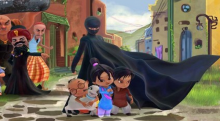
Pakistan’s new animated television series, “Burka Avenger,” features a female Muslim teacher disguised in a tight black outfit with a cape and ninja-style head cover who throws heavy books and sharp pens at men who oppose education for girls.
The fictional show coincides with the real life of Malala Yousafzai, the teenage Pakistani student who was shot in the head in an unsuccessful bid to kill her because she spoke out in support of girls’ education.
The Burka Avenger has been mostly victorious against her Taliban-like enemies during the first two shows, which began on July 28.
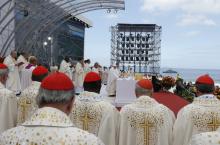
In the wake of Pope Francis’ triumphant visit to Brazil, writers for the rival National Catholic Register and National Catholic Reporter were left debating whether he’s “a gift to the church” or a “revolutionary.”
The Italian edition of Vanity Fair has named him Man of the Year. The Washington Post Wonkblog, of all places, quotes him in a post on forgiveness. Ross Douthat in The New York Times nods approvingly at a piece in The Telegraph that says Francis has “decontaminated the Catholic brand.”
And so on and so on.
Not bad for four months on the job.

A controversial Muslim scholar-turned-television-host has given away at least two abandoned babies during his live TV show in Pakistan, saying “it is real Islam” and not exploitation because the infants find homes with couples who want to adopt.
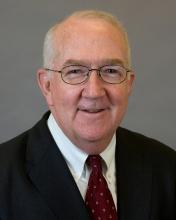
The U.S. Senate has confirmed former Catholic Relief Services head Ken Hackett to be the next ambassador to the Vatican.
Hackett replaces Miguel Diaz, a theologian, and he gives President Obama an experienced voice on social justice in Rome where a new pope, Francis, has made caring for the poor a priority.
Hackett’s confirmation came Thursday night by unanimous consent as senators wrapped up loose ends before the summer recess.
No opposition was expected since Hackett has strong ties to both parties; for five years he served on the board of former President George W. Bush’s Millennium Challenge Corporation and he is reported to be close to Denis McDonough, Obama’s chief of staff, whose brother is a priest.
IN "SILENCE FOR GAZA,” Palestinian poet Mahmoud Darwish captures the contradictions of the coastal enclave, describing it alternately as “ugly, impoverished, miserable,” and “the most beautiful, the purest and richest among us.” Darwish’s antonyms evoke Gaza’s crushing conditions and resilient residents, exemplars of sumud, an Arabic word roughly translated as “steadfast perseverance”—a fundamental form of Palestinian resistance. Darwish’s poem also states that Gaza “did not believe that it was material for media. It did not prepare for cameras and did not put smiling paste on its face.” And yet every person, every story, every image of Gaza illustrates this persistent paradox of a land at once ugly and beautiful.
“I DON’T KNOW why they targeted us. No rockets were fired from our neighborhood,” says citrus farmer Yusuf Jilal Arafat, whose 5-year-old daughter Runan was killed when Israeli warplanes bombed their home. Arafat’s wife, four months pregnant, and their 8-year-old son were found alive in the rubble. His surviving children now suffer from frequent panic attacks at night. Many of Arafat’s trees were destroyed by the bombs, and the ground is covered with oranges now in various stages of decay. Rumors of contamination by Israeli weapons may hurt the sales of his crop, but he will still harvest. The family is living with Arafat’s father-in-law until they can rebuild.
Rebuilding under Israeli import restrictions is no simple task, so salvaging existing materials remains a vital practice—albeit risky, according to structural engineers. But ingenuity-by-necessity is constantly on display in Gaza, whether it’s recovering crushed stone from beneath ruined highways, straightening steel rebar from bombed-out buildings, or pulverizing concrete for reuse in new (but weaker) blocks.
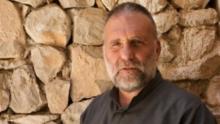
A prominent Italian Jesuit who is an outspoken supporter of the uprising against Syrian President Bashar al-Assad went missing in Syria Monday, fueling speculation that he has been kidnapped by an Islamist group.
The Rev. Paolo Dall’Oglio, 58, lived for three decades in Syria, where he established an ecumenical community at Mar Musa on the site of an early Christian monastery, engaging in interfaith dialogue with Muslims and forging close ties with the local population.
He was expelled in 2012 by the Assad government for his support of the rebels.

By now most of the world knows the royal family in England is celebrating the birth of little baby George Alexander Louis. The commentators panted as they caught the first glimpses of the magic baby, about everything from the infant's apparent ability to withstand a media onslaught to the ever-so-newsworthy fact that his father drove the family home with his own two hands.
Meanwhile in Iraq, several hundred prisoners of the infamous Abu Ghraib facility escaped, many of whom were known or suspected members of Al Qaeda. Considering the attention given to the few dozen detainees still held in Guantánamo Bay, it seems reasonable to think that such a breakout would arrest the headlines around the globe.
But instead, we stayed focused for the most part on baby George. I remarked about this to my friend, sharing my concern about the apparent distortion of priorities. He suggested that it simply is a sign of cultural fatigue, or even resignation. Sometimes, after all, these stories that have international importance seem so big, so abstract, and so far away that it is hard to wrap our minds around them. It’s easier instead to set our attention on something more hopeful — albeit remarkably more superficial — that won’t keep us awake at night.
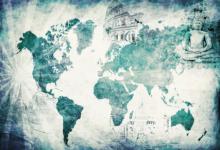
Tumult in Egypt reminds me how complicated the world can be, especially for a culture like our own that is shaped by good guy vs. bad guy dramas.
Who are the “good guys” in Cairo? Is the ousted president a good guy for being democratically elected or a bad guy for pursuing isolationist Islamic policies? Is the military saving Egypt or preserving privileges?
It isn’t just the inherent complexity of any human situation. It’s the complexity of societies that have rules and histories quite unlike our own.
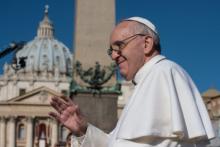
In his first official trip outside Rome since his election, Pope Francis visited the tiny island of Lampedusa off the coast of Sicily on Monday, hoping to show solidarity to African migrants who risk their lives trying to immigrate to Europe.
Set only 70 miles from Tunisia, the Italian island of Lampedusa is the first port of safety for the thousands of undocumented migrants and asylum seekers who risk their lives every summer trying to reach Europe on small, rickety boats.
Francis said the frequent news reports on the deaths of the people who were trying to make the crossing had been like “a thorn in the heart” for him, and called on society to overcome what he called “the globalization of indifference.”

Egypt's military forcefully seized power from President Morsi on Wednesday. An emergency meeting of top civialian and religious leaders has convened to create an interim government and plan for new elections. The whereabouts of Mr. Morsi remain unknown. The New York Times reports:
The developments followed the lapse of a 48-hour deadline imposed by the military generals on the increasingly isolated president to meet the demands of millions of Egyptians disaffected with the one-year-old governance of Mr. Morsi, the first democratically elected leader of Egypt.
Read more here.
WATCH LIVE:
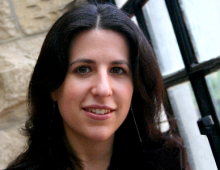
IN HER JEWISH school in Montreal, Ronit Avni learned the tragic history of her people. Her Canadian mother and Israeli father had met in the ’60s when her mother was living in Israel and working as a folk singer, often performing for Israeli troops. Her older sister was born in Tel Aviv, but the family settled back in Montreal in the mid-’70s before Ronit was born.
Not strictly religious but committed to the values of Judaism, Ronit couldn’t help but ask probing questions as she listened to the stories of the birth of the modern state of Israel in 1948. Am I hearing the whole story? How do Palestinian perspectives differ from what my educators and community leaders are teaching? How can we transform this situation from a zero-sum equation to one that respects the dignity and freedom of all?
Years later, having graduated with honors from Vassar College with a degree in political science after studying theater at a conservatory in Montreal, Ronit trained human rights advocates worldwide to produce videos as tools for public education and grassroots mobilizing.
By the time I met Ronit a few years ago, she had narrowed her worldwide focus to the Israeli-Palestinian conflict, where her heart was most deeply drawn. She is the founder and executive director of Just Vision, an organization dedicated to increasing media coverage and support for Palestinian and Israeli efforts to end the occupation and conflict without weapons of violence.
During the last several years, my engagement in the Holy Land has been significantly shaped by Ronit. Her film Encounter Point, about Israelis and Palestinians who have lost family members, land, or liberty to the conflict yet choose forgiveness and reconciliation rather than revenge, gave me hope that peace can emerge from pain.